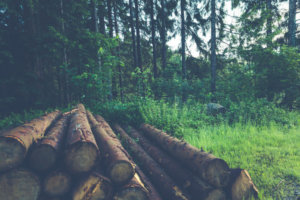Giving forestry “The Agriculture Treatment”

When forest management is done well it makes our forests healthier, more complex and more resilient; provides incredible habitat for wildlife; and produces local, renewable resources. Responsible forest management supports many things we value, from healthy local economies and ecology to the culture and the character of our communities. As someone who believes in forest management, a big part of my job involves diffusing misunderstandings about it, asking people to reexamine deeply rooted misconceptions about forestry and logging. I do this because I genuinely believe that forest management can be part of how we build a better world.
Recently, I’ve been marveling at the amazing culture we’ve built around local agriculture in Vermont and wondering why the same pride doesn’t always apply to local forestry. Forest management and agriculture have a lot in common: they are both types of land use, in which we manage our environment for a renewable resource. In the case of agriculture, it provides us with delicious food. In the case of forestry, it provides us with beautiful wood. But, while we love and celebrate the farms that dot our landscape and the farmers and the food that show up at summer farmer’s markets, forestry receives a much less universally warm treatment.
Like agriculture, forestry can be done in different ways and at different scales. Comparing historic and industrial forestry practices to forest management in Chittenden County is like comparing industrial agriculture in the Midwest with Vermont’s local organic farms. Like farming, forest management can be extractive and commodity focused, or it can be regenerative, producing amazing renewable resources while leaving a healthier ecosystem in its wake.
An important part of understanding our role with respect to forests and other ecosystems means recognizing that the question is not if we want to have an impact. Rather, it is: what do we want that impact to be? Humans always have and always will consume resources—the things we eat, we wear, we use to fuel our lives. Everything is made of something and comes from somewhere—and there is no way to extract, process and transport resources without having an impact on ecosystems. Depending on the resource, those impacts could be minor or ephemeral (as in the case of most renewable resources) or major and permanent (as is the case of many non-renewable resources).
The cheapness and availability of non-local resources allows us to pretend that we can consume without costs to our ecosystems, but it doesn’t erase those impacts—it just displaces them to peoples and ecosystems somewhere else, perhaps at environmental and social costs that we wouldn’t find acceptable if they were in our communities.
In forestry, as in agriculture, if we can move past denying that our actions have environmental impacts, we can start being proactive. Using local resources, especially local renewable resources, means owning those impacts, keeping them right where we can see them. Some of these impacts—benefits to our local economies, our neighbors, the culture and the character of our communities, our working landscape—are easy to own. Others, like the initial messiness of a freshly managed forest or the buzz of a chainsaw from your neighbor’s woodlot, may be a little more challenging.
Bringing our resource consumption home means that we take the radical step to confront the impacts that our lives have on our world with our eyes wide open. It allows us to actively develop a relationship with our resources, rather than consuming without an understanding of the toll we are taking on ecosystems and peoples across the world.
The way that we use land and alter ecosystems will always be a compromise. After all, virtually every farm in Vermont (and every one of our houses and businesses) is on a site that was a forest or a wetland just a few hundred years ago. We accept these environmental impacts because they allow us to live happy, healthy lives in a beautiful place, to eat delicious food, and to be warm all winter.
In comparison, forest management is a small compromise—harvesting a renewable resource while keeping ecosystems intact, encouraging great wildlife habitat and the “ecosystem services” that make our world work, keeping our communities beautiful and functional. Treating local forestry like local agriculture is something that may require some of us to re-examine how we think about it—but it’s worth the effort.
Ethan Tapper is the Chittenden County Forester. He can be reached by email or at (802) 585-9099.

